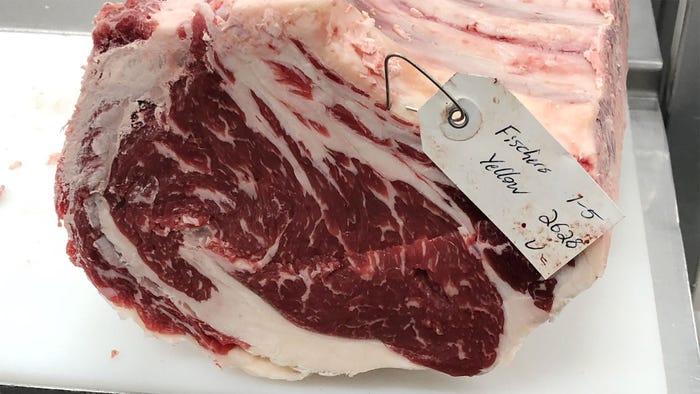
It’s 2003 in Celestine in Dubois County, Ind. The Sander family opens a new meat processing facility. Meanwhile, Dave Fischer and family head home to join his father, Joe, on a sixth-generation livestock farm. Dave and his wife, Diana, start a local, natural meat business. They strike an agreement to process cattle at the Sander facility. By 2004, Fischer Farms meat business is underway.
Fast-forward to 2024. Shift just a few miles to St. Anthony. Sander Family Meats processes and sells retail at a location there that opened in May 2021. It shares the site with Fischer Farms. A tunnel connects two buildings. Animals are slaughtered and processed on the Sander side. Meat for Fischer Farms is carted to the other building, packaged and boxed by Fischer Farms employees. Then it is sorted for shipping to 150 restaurants, 12 retail stores, 40 online customers and Indiana University dining halls.
“The Sander family owns their side, and we own ours,” Dave says. “Most meat in their retail storefront is theirs, but we place some products in their meat case. In addition, they offer goods produced locally, and we offer some online. We both support local producers, and our customers appreciate that we source other locally produced items.”
Quality and consistency
So, how did a cattle producer go from ground zero to moving 30 head of cattle and 90 hogs, plus eggs, turkeys and more in just 20 years?
“We’ve always emphasized quality, and it starts with genetics and includes how we feed animals,” Dave says. “Our cattle are Angus and Shorthorn crosses. It’s important to track genetics and continue improving.
“Marbling is key. We evaluate marbling on steaks from every animal. Then, we track it back to its genetics. If meat from a specific animal isn’t meeting marbling standards, we make changes.
“Anybody can raise one quality animal,” he continues. “The trick is doing it with 30 animals per week, every week.”
Today, Dave can’t produce enough cattle. He works with local producers but monitors their genetics and feeding methods. “We make sure meat from their animals meets our standards,” he says.
Hogs are raised by the Gutgsell family, including Mark, Bernie, Wes and Kyle. Using Duroc boars and following consistent feeding guidelines, they produce hogs that yield consistent, high-quality carcasses.
“They follow the same philosophy we do, growing natural meat without feed additives,” Dave explains.
Serving customers
Someone from Indiana University didn’t just call Dave and ask, “Could you supply meat for all our dining halls?” That’s not how life works, he says.
“It took a lot of knocking on doors, telling our story and patience,” he says. “The university is very conscious about environmental sustainability, and we’ve also been concerned for a long time, too. The more we demonstrate that we produce meat humanely and in an environmentally friendly way, the better they like it.”
Today, Diana is CEO of the meat business, while Dave concentrates on raising animals. Diana has a crew of employees, and Dave has four employees to operate their 450-cow beef herd.
Fischer Farms owns and operates one delivery truck, which makes a run weekly to the IU campus and Indianapolis. The rest of the meat is picked up at its St. Anthony location by either retailers or distributors. Often, trucks deliver goods nearby, then pick up meat for the back haul, reducing overall fuel emissions.
“Filling orders and tracking meat isn’t as complicated as it sounds,” Diana says. “Dave custom-designed software suited to how we operate. We can track individual cuts and fill orders easily.”
Learn more about Fischer Farms online, and check out its lineup of products.
About the Author(s)
You May Also Like




